Login
Registration enables users to use special features of this website, such as past
order histories, retained contact details for faster checkout, review submissions, and special promotions.
order histories, retained contact details for faster checkout, review submissions, and special promotions.
Forgot password?
Registration enables users to use special features of this website, such as past
order histories, retained contact details for faster checkout, review submissions, and special promotions.
order histories, retained contact details for faster checkout, review submissions, and special promotions.
Quick Order
Products
Antibodies
ELISA and Assay Kits
Research Areas
Infectious Disease
Resources
Purchasing
Reference Material
Contact Us
Location
Corporate Headquarters
Vector Laboratories, Inc.
6737 Mowry Ave
Newark, CA 94560
United States
Telephone Numbers
Customer Service: (800) 227-6666 / (650) 697-3600
Contact Us
Additional Contact Details
Login
Registration enables users to use special features of this website, such as past
order histories, retained contact details for faster checkout, review submissions, and special promotions.
order histories, retained contact details for faster checkout, review submissions, and special promotions.
Forgot password?
Registration enables users to use special features of this website, such as past
order histories, retained contact details for faster checkout, review submissions, and special promotions.
order histories, retained contact details for faster checkout, review submissions, and special promotions.
Quick Order
PathPlusTM ACPP / PAP Antibodies
PSAP (ACPP, prostatic acid phosphatase) is a dephosphorylating enzyme produced in prostatic glandular epithelium. PSAP is a positive biomarker for hyperplastic prostate in immunohistochemistry and may be used to identify prostate origin in metastatic cancers. PSAP distinguishes prostate cancer (positive) from urothelial cancer, mesonephric remnant hyperplasia and clear cell tumors (generally negative). It is also positive in bladder and rectal carcinomas. Higher expression in tumors has been correlated with increasing tumor stage, although it is thought to be a tumor suppressant by means of vitamin D-associated slowing of prostate growth. Lower expression in normal tissue is therefore thought to be a risk factor for the development of cancer. In immunohistochemistry of normal tissue, antibodies to PSAP have cytoplasmic positivity in lysosomal granules in normal prostatic epithelial and ductal cells.
References: Virchows Archiv: An International Journal of Pathology 2009-05; 454.5; 573-579, PMID: 19301031; Cancer Research 9/1/1992; 52.17; 4600-4607, PMID:1380886; The Journal of Steroid Biochemistry and Molecular Biology 2005-10; 97.43102; 37-46, PMID: 16076555; Biomolecules & Therapeutics 2013-01; 21.1; 43393, PMID: 24009853; Journal of Immunology (Baltimore, Md.: 1950) 12/15/2001; 167.12; 7150-7156, PMID: 11739538; The American Journal of Surgical Pathology 1991-08; 15.8; 785-790, PMID; 1712549; Appl Immunohistochem Mol Morphol. 2002 Sep;10(3):231-6, PMID: 12373149; Ann Diagn Pathol 2009;13:402, PMID: 19917478;
7 PathPlusTM Antibodies
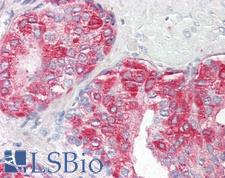
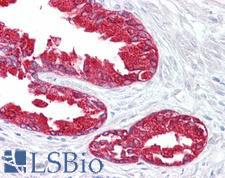
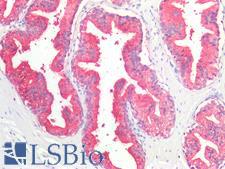
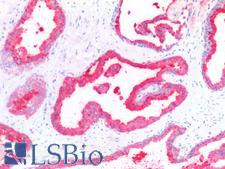
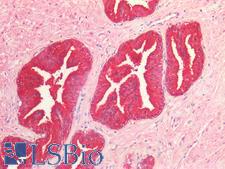
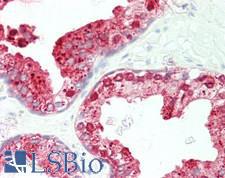
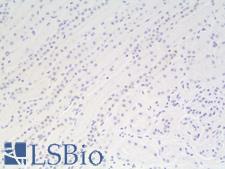
☰ Filters
Products
Antibodies
(7)
Type
Primary
(7)
Target
ACPP / PAP
(7)
Reactivity
Human
(7)
Mouse
(4)
Rat
(3)
Bat
(1)
Bovine
(1)
Dog
(1)
Hamster
(1)
Monkey
(1)
Rabbit
(1)
Application
IHC
(4)
IHC-P
(7)
WB
(5)
ICC
(1)
Peptide-ELISA
(1)
Host
rabbit
(4)
mouse
(1)
goat
(1)
chicken
(1)
Product Group
PathPlus Cancer
(7)
PathPlus Cancer Pathology
(7)
Isotype
IgG
(1)
IgG1,k
(1)
Clonality
polyclonal pc
(6)
recombinant monoclonal rmc
(1)
Clone
rACPP/1338
(1)
Format
Unconjugated
(7)
Epitope
aa200-300
(1)
aa215-264
(1)
aa217-386
(1)
aa313-341
(1)
Publications
No
(7)

Cancer Pathology
Cancer
ACPP / PAP Goat anti-Human Polyclonal (aa200-300) Antibody
Rabbit, Mouse, Dog, Bovine, Rat, Hamster, Bat, Human, Monkey
IHC, IHC-P, Peptide-ELISA, WB
Unconjugated
50 µg/$485

Cancer Pathology
Cancer
ACPP / PAP Rabbit anti-Human Polyclonal (aa313-341) Antibody
Mouse, Human
IHC, IHC-P, WB
Unconjugated
100 µl/$375

Cancer Pathology
Cancer
ACPP / PAP Rabbit anti-Human Polyclonal Antibody
Mouse, Rat, Human
IHC-P, WB
Unconjugated
50 µl/$460

Cancer Pathology
Cancer
ACPP / PAP Chicken anti-Mouse Polyclonal Antibody
Mouse, Rat, Human
IHC, IHC-P
Unconjugated
100 µl/$375

Cancer Pathology
Cancer
ACPP / PAP Rabbit anti-Human Polyclonal (aa217-386) Antibody
Human
ICC, IHC-P, WB
Unconjugated
50 µl/$375

Cancer Pathology
Cancer
ACPP / PAP Rabbit anti-Human Polyclonal (aa215-264) Antibody
Human
IHC, IHC-P, WB
Unconjugated
100 µl/$375

Cancer Pathology
Cancer
ACPP / PAP Mouse anti-Human Recombinant Monoclonal (rACPP/1338) Antibody
Human
IHC-P
Unconjugated
100 µg/$485
Viewing 1-7
of 7
product results











